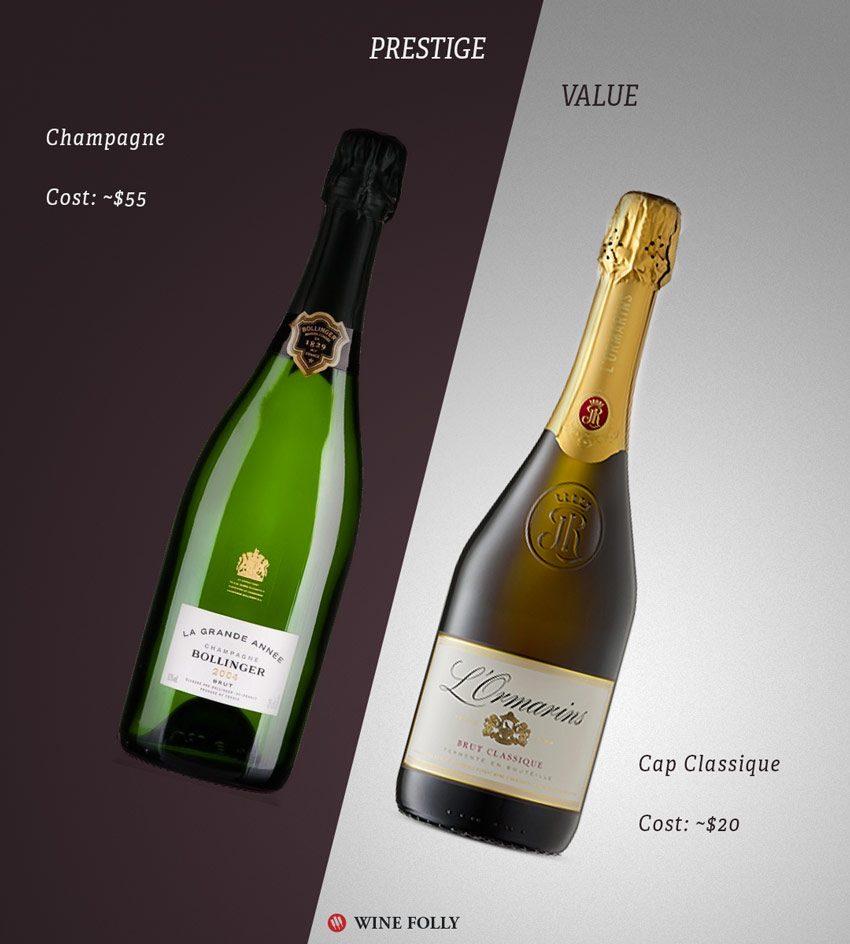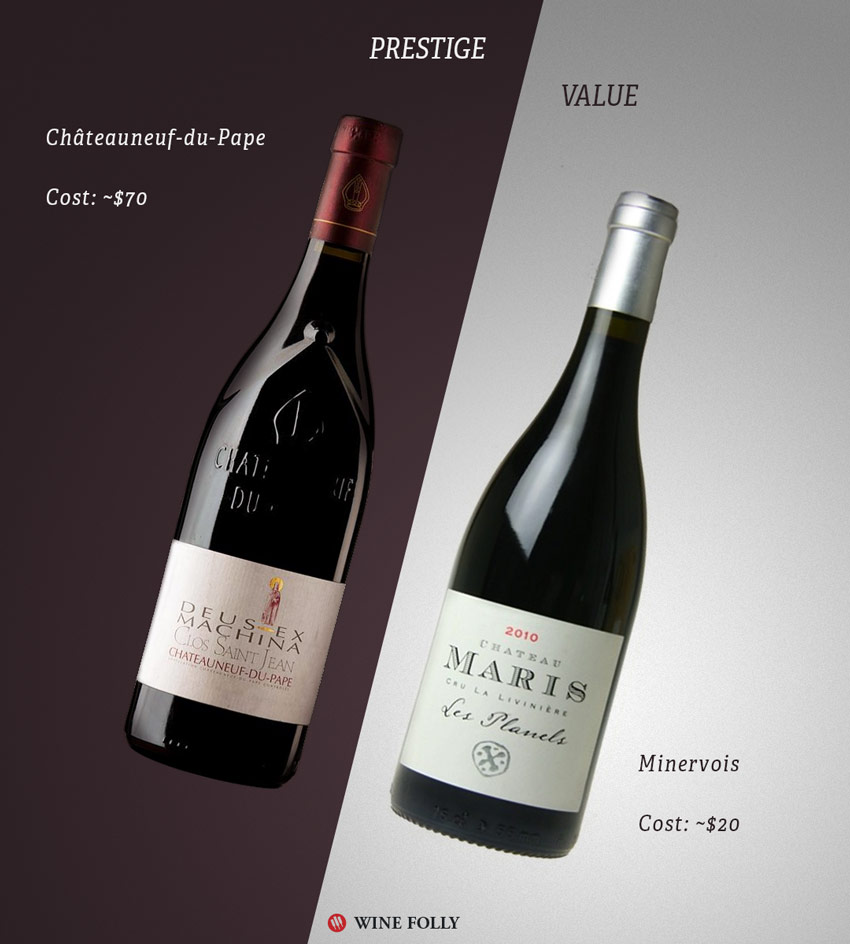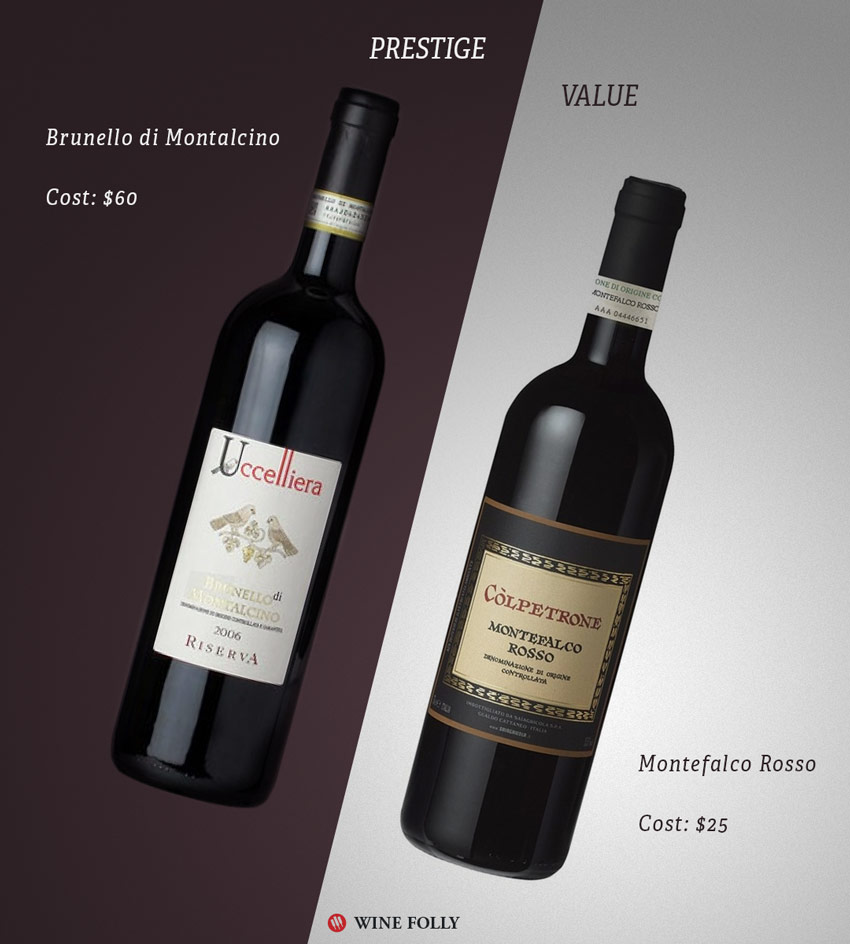Love great wine but live on a budget?
Yeah…duh.
Here are 5 exceptional wines and their value-friendly alternatives. As it happens, great wines can be found almost everywhere; you just need to know where to look.
Fine Wine Alternatives
Champagne
Blend: Chardonnay, Pinot Noir, and Pinot Meunier
Minimum Cost for Exceptional Quality: $55
Read more: Getting into Grower Champagne
Champagne is to sparkling wine as Kleenex is to tissue paper. This name-branded region in France produces some of the most exalted and delicious sparkling wines in the whole world. It also produces a boat-load of average-quality bubbly at top-dollar prices. So, when you treat sparkling wine like beer (which, we do), it’s always a good idea to expand your search for budget-friendly bubbly.
Méthode Cap Classique
Blend: Mostly Chardonnay and Pinot Noir with some Chenin Blanc and Pinot Meunier
Minimum Cost for Exceptional Quality: $20
South Africa is not what most would think of as a sparkling wine superstar, but it is. The region made a special designation called Méthode Cap Classique to classify and ensure quality for their sparkling wines in 1992. Wines are made with the same varieties as Champagne, including Pinot Noir and Chardonnay, and many are aged (en tirage) for over 3 years, which is equivalent to vintage Champagne. Shockingly, the South Africans keep relatively quiet about the amazing quality of their sparkling wines. More for us.
Châteauneuf-du-Pape
Blend: GSM Blend: primarily Grenache, Syrah, and Mourvèdre, and also combined with Cinsault, Carignan, and others
Minimum Cost for Exceptional Quality: $70
Read more: Châteauneuf-du-Pape: Drink like a 14th Century Pope
Châteauneuf-du-Pape is a tiny appellation in the greater region of Côtes du Rhône, which some cite as the ultimate expression of the GSM Blend. Châteauneuf-du-Pape gives layers upon layers of fruit, resinous herbs, and unctuous cured meats that roll around in your mouth, confusing and delighting you at the same time. In short, it’s delicious. Of course, ever since wine critic Robert Parker started fawning over the region, the wines have become increasingly harder to come by.
Minervois
Blend: Carignan, Syrah, Grenache, and Mourvèdre
Minimum Cost for Exceptional Quality: $20
Read more: Get to Know the Languedoc-Roussillon Region
Next door to the Rhône is the Languedoc-Roussillon wine region, which contains the appellations of Minervois, Saint-Chinian, and Faugères. These regions use the same grapes as Côtes du Rhône, but don’t have the help of wine critics to make them famous. The high-quality wines from this area tend to come from the older Carignan vines that produce wines with intense red fruit and meaty notes, which can rival a Châteauneuf-du-Pape. Omg yes!
Brunello di Montalcino
Blend: 100% Sangiovese
Minimum Cost for Exceptional Quality: $60
Read more: Brunello di Montalcino… it’s worth the wait
It’s only the most prestigious viticultural area in Tuscany, specializing in 100% jaw-dropping red-fruit packed Sangiovese. The wines reach a new level of wow-factor, displaying more fig, dried red fruits, and leather when they age for at least 10 years (and sometimes several decades). Of course, as one of the most well-known regions in Tuscany for Sangiovese, Montalcino is in high demand.
Montefalco Rosso
Blend: 60-70% Sangiovese, 10–15% Sagrantino, 15-30% Others
Minimum Cost for Exceptional Quality: $25
Read more: A Simple Guide to Wines of Umbria
Approximately a 2-hour drive to the east of Montalcino is Montefalco, which lies in the less-traveled region of Umbria. The Rosso blend includes mostly Sangiovese plus a dab of the regional grape, Sagrantino, which contains some of the highest levels of polyphenols (antioxidants) of any red grape. Even in small amounts, Sagrantino adds impressive body, color, and dimension to Montefalco Rosso wines. At the moment, the Montefalco region (and several others in Umbria) are growing by leaps and bounds, making it a great place to look for quality and good value.
Red Burgundy
Blend: 100% Pinot Noir
Minimum Cost for Exceptional Quality: $60
Read more: Simple Guide to the Wines of Burgundy
Nothing is so singular to French wine enthusiasts than the subtle complexity of Bourgogne Rouge (Red Burgundy). Pinot Noir from the “Pinot Motherland” takes on a distinctly more earthy profile with delicate aromas of roses, cherries, and mushroomy forest floor. The wines are exceptional but also, nearly every sommelier (along with their Pinterest followers) have already confessed their undying love for this region, making it one of the highest-priced wine regions on the earth. Bummer dude.
Cru Beaujolais
Blend: 100% Gamay
Minimum Cost for Exceptional Quality: $25
Read more: The Secret to Finding Great Beaujolais Wine
Right next door to Burgundy is Beaujolais. This region is most known for Beaujolais Nouveau, which is one of the fastest selling wines to market (released in November, just after harvest). Of course, Bojo Nouveau has a below-average reputation. However, as soon as you look past this Nouveau category, things get marvelous. The Cru-designated wines (of which there are 10 regional crus) offer the same floral, fruit, and tilled soil character of great Red Bourgogne but at an exceptional price. Yum.
Bordeaux from Médoc and Graves
Blend: Cabernet Sauvignon, Merlot, Cabernet Franc, Malbec, and Petit Verdot
Minimum Cost for Exceptional Quality: $45
Read more: A Primer to Bordeaux Wine
The wines of the Médoc deliver a certain earthy elegance that hasn’t really been replicated in the New World. The pedigree of Bordeaux hit a new level when it became the darling of China’s wealthy population. Nowadays, several of China’s top stars and entrepreneurs own one or more Bordeaux Chateaux. So, with the prestige of the Médoc and the increasing international demand, you can expect to pay top dollar for a great quality Grand Vin.
Lebanon
Blend: Cabernet Sauvignon, Carignan, Syrah, and Cinsault
Minimum Cost for Exceptional Quality: $25
Lebanon isn’t what most people relate with historic, traditional fine wines, however, the region has been growing grapes and making wine for a lot longer than France and Italy. In fact, Vitis Vinifera (wine grapes) originate from around Lebanon and today you’ll find several producers bringing winemaking back in a big way. Lebanese reds have a striking resemblance to fine Bordeaux even if the blend is of their own making.
Last Word: What Globalization Means for Fine Wines
As more and more markets enter the fine wine buying market (e.g. China and India) we’re seeing price increases on the world’s most talked about wines (Bordeaux, Champagne, Bourgogne, etc.). Yes, it does suck, but it’s also a really exciting time for new regions to come to the forefront. As more wine regions invest in quality winemaking we’re going to see a brand new selection of awesome wines to choose from. So, never stop learning and… Salut!




